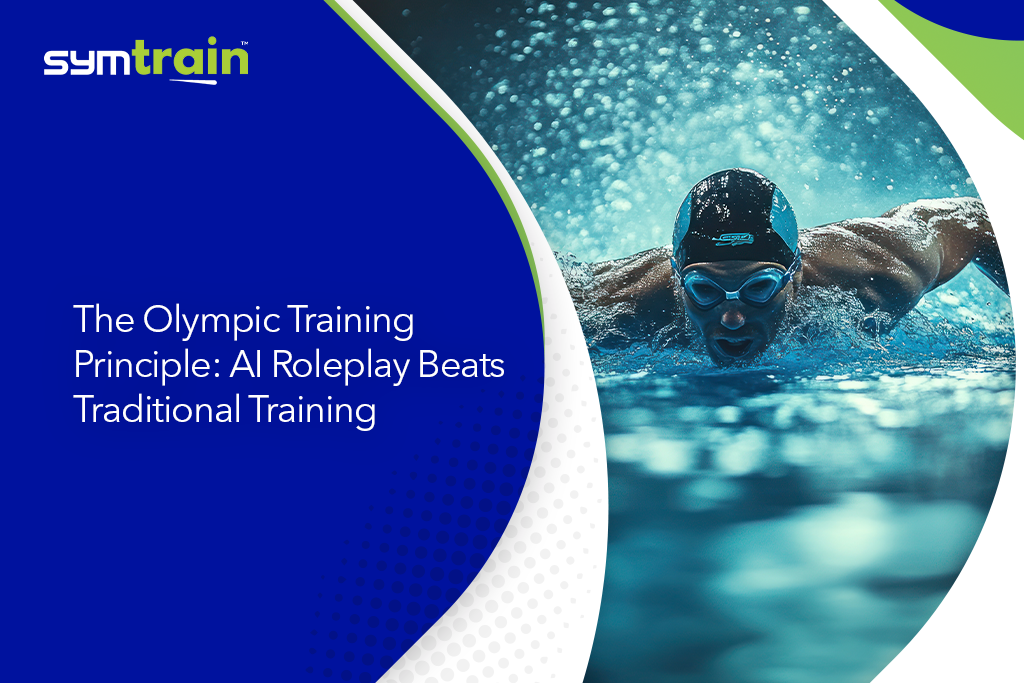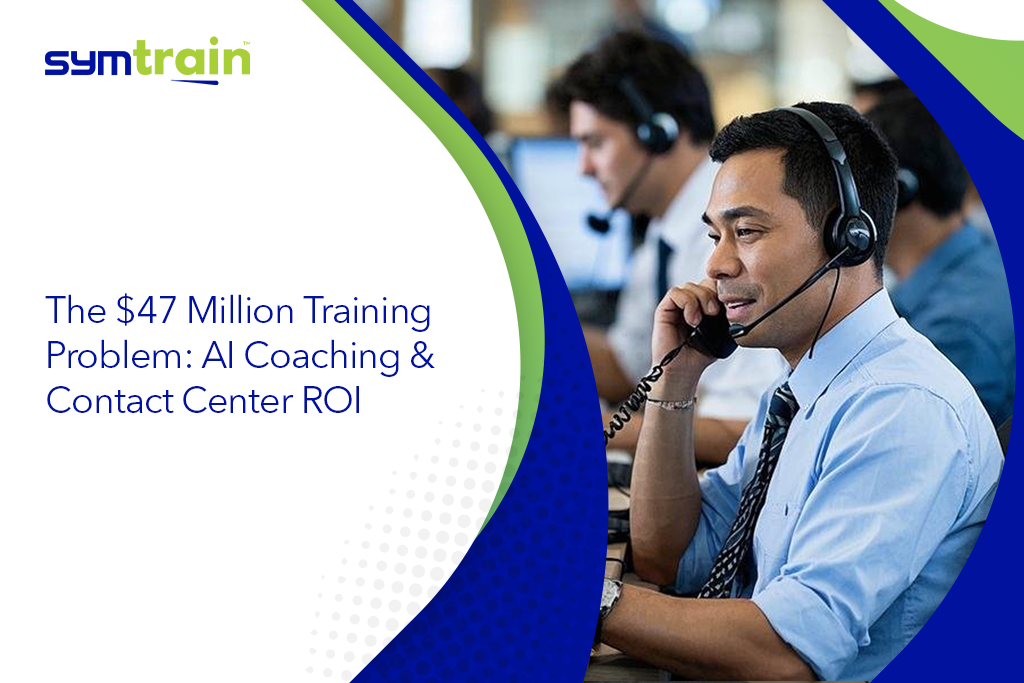The Olympic Training Principle - Why AI Roleplay Beats Traditional Call Center Training

What Olympic Swimming Coaches Know About Skill Acquisition That Most Call Center Trainers Miss
Michael Phelps earned 28 Olympic medals not through natural talent alone, but through a systematic training approach that his coach Bob Bowman developed over decades of studying human performance optimization. Bowman's methodology reveals principles about skill acquisition that directly apply to call center training and explain why AI roleplay technology produces superior results compared to traditional training approaches.
Bowman never trained Phelps in calm, perfect pool conditions. Instead, he deliberately created challenging practice environments that were actually more difficult than Olympic competition. Bowman would fog up Phelps' goggles during practice, adjust starting blocks to feel unstable, set pool temperatures uncomfortably warm, and create distractions that forced Phelps to maintain focus under adverse conditions.
This approach wasn't sadistic—it was scientifically designed around a fundamental truth about human performance development. The brain learns faster and retains skills longer when it encounters realistic challenges in controlled environments where failure doesn't create real-world consequences. When Phelps finally competed in actual Olympic events, the controlled pool conditions felt easy compared to his practice environments.
The principle that Bowman applied to swimming excellence—progressive overload training under realistic pressure—has revolutionized performance development across multiple fields. Professional pilots train in flight simulators that create emergency scenarios far more dangerous than typical flights. Military special forces train in simulation environments that exceed the complexity of actual combat situations. Surgical residents practice procedures using simulation software that generates complications they might encounter once in actual operating rooms.
The Fatal Flaw in Traditional Call Center Training Approaches
Traditional call center training operates exactly opposite to Olympic-level skill development principles. Instead of exposing agents to challenging, realistic practice scenarios, conventional training approaches use simplified roleplay sessions with polite colleagues acting as customers, scripted interactions with predictable outcomes, and practice environments that bear little resemblance to actual customer service challenges.
This approach is equivalent to training swimmers only in kiddie pools, then expecting them to compete in Olympic events. Agents practice handling pleasant customers with straightforward requests, then face genuinely frustrated callers with complex technical issues, multiple system navigation requirements, and emotional contexts they've never encountered before.
Traditional Contact Center Training Provides:
- 40-60 hours of classroom instruction
- 10-15 roleplay scenarios with scripted outcomes
- 2-3 weeks of monitored calls before independence
Real-World Customer Service Demands:
- Complex problem-solving capabilities under time pressure
- 200-300 unique customer situations in first month alone
- Different technical knowledge required for each interaction
- Emotional intelligence adaptation for varying customer states
How AI Roleplay Creates Olympic-Level Training Environments
AI roleplay technology solves the preparation gap by applying Olympic training principles to call center skill development. Instead of limited scripted scenarios, learning simulation software generates unlimited realistic customer interactions that expose agents to the full spectrum of challenges they'll encounter in their actual work environment.
The technology mirrors flight simulator training that prepares pilots for emergency situations. AI roleplay can generate hundreds of different customer personality types, emotional states, technical issues, and system complications that agents practice handling in controlled environments where mistakes become learning opportunities rather than customer satisfaction failures.
Consider how this approach addresses specific call center training challenges. Traditional roleplay might include one scenario about handling billing disputes. AI roleplay generates dozens of billing dispute variations: customers confused about charges, angry about incorrect billing, requesting payment plan options, disputing service quality, or dealing with system errors that affected their accounts. Each scenario includes realistic emotional contexts, specific account details, and multiple resolution pathways that mirror actual customer interactions.
The progressive difficulty structure of AI roleplay mirrors how Olympic coaches develop championship athletes. Initial scenarios focus on fundamental customer service skills with straightforward situations. As agents demonstrate competence, the simulation software introduces more complex challenges: multiple simultaneous issues, emotional customers, system complications, and time pressure scenarios that require advanced problem-solving capabilities.
A transportation and logistics BPO implemented this Olympic training approach when they needed to scale from 800 to 8,000 agents while maintaining service quality. Traditional training methods couldn't support this growth rate while ensuring consistent agent capabilities. AI roleplay technology allowed them to expose new agents to hundreds of realistic customer scenarios regardless of trainer availability or scheduling constraints.
The Neuroscience of Learning Through Realistic Simulation
Understanding why AI roleplay produces superior learning outcomes requires examining how the human brain develops expertise through repeated exposure to challenging scenarios. Dr. K. Anders Ericsson's research on deliberate practice reveals that expert-level performance develops through specific training conditions that simulation software can replicate more effectively than traditional training approaches.
Deliberate practice requires immediate feedback, progressive difficulty increases, and realistic challenge scenarios that push learners beyond their current comfort zones. Traditional call center roleplay typically fails on all three criteria: feedback is delayed and subjective, difficulty levels remain static, and scenarios lack the complexity and emotional intensity of real customer interactions.
AI roleplay addresses each deliberate practice requirement systematically. The technology provides immediate, objective feedback on communication effectiveness, problem-solving approaches, and emotional intelligence demonstrations. Difficulty levels adjust automatically based on individual agent performance, ensuring optimal challenge levels that promote skill development without creating overwhelming stress.
The realistic complexity of AI-generated scenarios triggers the same neural pathway development that creates expertise in other high-performance fields. When agents practice handling angry customers with complex technical issues through simulation software, their brains develop automatic response patterns that activate during actual customer interactions.
Neuroscience research demonstrates that skills developed through realistic simulation transfer more effectively to real-world performance than skills learned through simplified practice environments. This explains why pilots trained in advanced flight simulators outperform those trained only in actual aircraft, why surgeons practicing on simulation software show better surgical outcomes, and why agents trained through AI roleplay demonstrate superior customer service capabilities.
Measuring Olympic-Level Results: Performance Metrics That Matter
Championship organizations measure training effectiveness through performance indicators that demonstrate real-world capability improvements rather than just training completion statistics. Call centers implementing AI roleplay should track metrics that reflect actual customer experience enhancements and business outcome improvements.
Primary performance indicators include first-call resolution rate improvements, average handle time optimization, customer satisfaction score increases, and agent confidence measurement through validated assessment tools. These metrics directly correlate with business results and demonstrate return on investment from learning simulation software implementation.
The measurement approach should mirror how Olympic training programs track athlete development. Leading indicators include practice session completion rates, scenario difficulty progression speeds, and skill demonstration consistency across different challenge types. Lagging indicators include actual customer interaction outcomes, business performance improvements, and long-term agent retention and career advancement rates.
The Competitive Advantage of Olympic-Level Training
Contact centers that implement AI roleplay early gain competitive advantages similar to what countries achieve through Olympic training program innovations. While competitors continue using traditional roleplay methods with limited scenarios and predictable outcomes, championship organizations build agent capabilities through unlimited realistic practice opportunities that exceed customer service requirements.
The mathematics of competitive advantage become compelling when comparing training approaches systematically. Traditional call center training provides exposure to 10-15 customer scenarios over 8-12 weeks. AI roleplay delivers 200+ scenario variations over 4-6 weeks. This 10-20x increase in practice volume, combined with progressive difficulty and realistic complexity, creates agent capabilities that conventional training methods cannot replicate.
The network effects of Olympic-level training compound over time as agents develop championship capabilities that improve customer satisfaction, reduce operational costs, and create positive feedback loops for continuous improvement investment. These effects mirror how Olympic training innovations create sustainable competitive advantages for countries and organizations that adopt them early.
Ready to implement Olympic-level training for your contact center? Experience AI roleplay technology through our championship training demonstration, to discuss your specific training objectives and implementation timeline.


